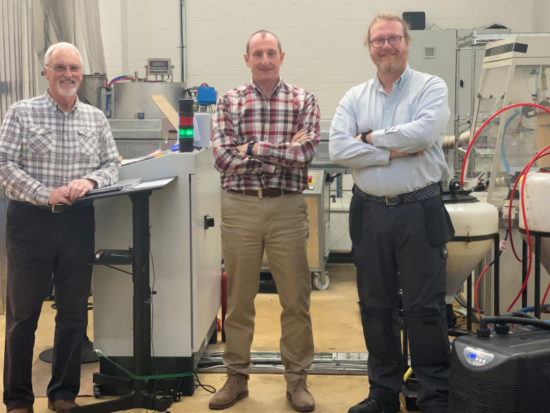LSF wins Continental Challenge
 (l-r): John Taylor, LSF co-founder & CEO; Glenn Halliday, co-founder & COO; Mark Bolton, operations manager (Photo: LSF)
(l-r): John Taylor, LSF co-founder & CEO; Glenn Halliday, co-founder & COO; Mark Bolton, operations manager (Photo: LSF)
UK firm Low Sulphur Fuels Ltd. (LSF) is the winner of the second Continental Challenge for sustainable material solutions. The Amersham-based enterprise prevailed over more than 50 participants from across the world with its conversion technology that can produce low sulphur distillate from end-of-life hydrocarbon materials such as oils and tyres.
Jury president Dr Jens Högermeier, head of Advanced Technology Development within Continental’s ContiTech business area, explains why they selected LSF: “With our challenges, we set out to find sustainable material solutions to be used on an industrial scale. The innovators at Low Sulphur Fuels have developed a convincing process that has the potential to solve a number of the unanswered questions of plastics and rubber recycling.”
LSF’s winning idea recycles mechanically sorted plastic materials, end-of-life tyres and rubber products as well as used oils through its Fast Electrochemical Process (FEP). Within this closed-loop oxidation process, the feedstock is first heated to its gas phase and then reacted with a proprietary electrolyte. The distillate is then separated and washed, resulting in a low sulphur distillate, broad-range naphta and raw carbon black which can then be used as feedstock materials for the chemical, automotive and other industries.
“We are very happy that we successfully demonstrated FEP’s potential to the Continental material experts and we are looking forward to further collaborating on sustainable recycling solutions,” Glenn Halliday, co-founder and chief operating officer of LSF.
From 50+ entries to 1 winner
More than 50 international start-ups and university institutes entered the second Continental Challenge, which placed a focus upon chemical polymer recycling solutions for engineering plastics. After whittling this down to 13 ideas, a reviewer team from across Continental’s business units took a close look at the submitted concepts and processes before that shortlist was again narrowed down to four finalists. These four prospects then presented their ideas online to a jury more than 30 material experts, including Dr Jens Högermeier, Dr Daniel Biensfeld (head of Continental’s Sustainable Materials innovation field) and Dr Steffen Wietzke (head of Continental’s Thermoplastics innovation field).
Continental’s partner, Berlin-based non-profit INAM (Innovation Network for Advanced Materials), was again responsible for conducting the Continental Challenge and determining the most promising concepts for the shortlist. “We were very excited to see so many interesting entries from all across the world,” said Oliver Hasse, managing director INAM. “We are convinced that, by enabling innovators in their efforts to make their advanced and innovative products market-ready, they can provide break-through solutions to the sustainability challenges of our times.”
Evaluating potential joint development
The Continental Challenge is one of a number of initiatives launched by the technology company as part of its sustainability roadmap. Continental says it is implementing one of the “most comprehensive sustainability roadmaps in the automotive supply sector,” with an aim of achieving 100 per cent climate neutrality, 100 per cent emission-free mobility and industries, 100 per cent circular economy and 100 per cent responsible value chain by no later than 2050. The programme not only includes Continental’s own production, but also focuses on the upstream stages and end-of-life recycling of products. “That is why, in our view, LSF’s recycling process has the most holistic potential to be used in an industrial setting,” concludes Dr Wietzke.
In winning the Continental Challenge, Continental states that LSF has now “found an industry expert” as a partner. Together with Continental’s material experts, the LSF team will evaluate the solution for a potential joint development as well as possible industrial upscaling. sg




Comments